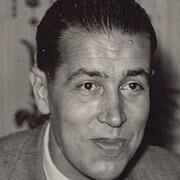Francis Ambrière (1907–1998)
Author of Greece (Blue Guide)
About the Author
Image credit: gallica.bnf.fr
Works by Francis Ambrière
Les Guides Bleus: Auvergne et Centre 3 copies
Belgique Luxembourg 3 copies
Maroc, Le 3 copies
Hollande 2 copies
Portugal - Madère - Açores 2 copies
Provence - Côte d'Azur 2 copies
Normandie 2 copies
Flandre, Hainaut, Artois, Picardie 2 copies
Champagne Ardenne Vallée de la Meuse 2 copies
L'Italie en un volume 2 copies
Environs de Paris Ile-de-France 2 copies
Madagascar 1 copy
LAS GRANDES VACACIONES 1 copy
Le Solitaire de la Cervara 1 copy
Franche-Comté / Monts Jura 1 copy
Corse (guide bleu) 1 copy
Les Guides Bleus: Grece 1 copy
Les Guides Bleus: Sud-Ouest 1 copy
Touring Club Italiano: Italy 1 copy
Pologne 1 copy
Rome et ses environs 1 copy
Yougoslavie 1 copy
Mexique 1 copy
Bretagne 1 copy
Roumanie 1 copy
Israël 1 copy
Les châteaux de la Loire 1 copy
Corse, Ile d'Elbe, Sardaigne 1 copy
Savoie 1 copy
Tunisie 1 copy
Vosges, Lorraine, Alsace 1 copy
Dauphiné 1 copy
Bruxelles et ses environs 1 copy
Suisse 1 copy
Athens and Environs 1 copy
Bulgarie 1 copy
HOLLANDE - Les Guides Bleus 1 copy
Associated Works
France automobile en un volume — Editor, some editions — 7 copies
Tagged
Common Knowledge
- Canonical name
- Ambrière, Francis
- Legal name
- Letellier, Charles
- Birthdate
- 1907-09-27
- Date of death
- 1998-07-01
- Gender
- male
- Nationality
- France
- Country (for map)
- France
- Birthplace
- Paris, France
- Place of death
- Le Touquet, France
Members
Reviews
Awards
You May Also Like
Associated Authors
Statistics
- Works
- 73
- Also by
- 2
- Members
- 176
- Popularity
- #121,982
- Rating
- 3.0
- Reviews
- 1
- ISBNs
- 6
- Languages
- 1

It's written for a French audience right after the war with a fair amount of nationalistic furor, but that doesn't take away from the freshness of the events having just occurred. Ambriere actually wrote much of it while still in prison and smuggled his papers out, it has an immediacy that goes beyond the kind of heroic romanticism that typify many accounts like this. It doesn't flinch from the brutality of the Germans, but doesn't dwell on it. It's episodic and not particularly dramatic, but reads well and is entertaining.
I was unable to find any sort of critical writings about the book, it seems to be almost entirely forgotten. That's too bad as it's not badly written and is an interesting account about an alternative way many people spent WWII. These were military camps for soldiers protected by the Geneva Convention, not civilians camps like the Holocaust, very different. The many ways in which the French fooled the Germans with small acts of disobedience is probably the best part of the book, movie material like in "The Great Escape", but without the hoohah bravado, more stylistic French. Like when housewives hung up laundry to dry, they had red/blue/white clothing, the colors of the French flag. Or when a prisoner escaped by seducing a German widow, he then donned her dead husbands Nazi identity (uniform and papers) and lived the high life in Berlin for the rest of the war!
--Review by Stephen Balbach, via CoolReading (c) 2011 cc-by-nd… (more)